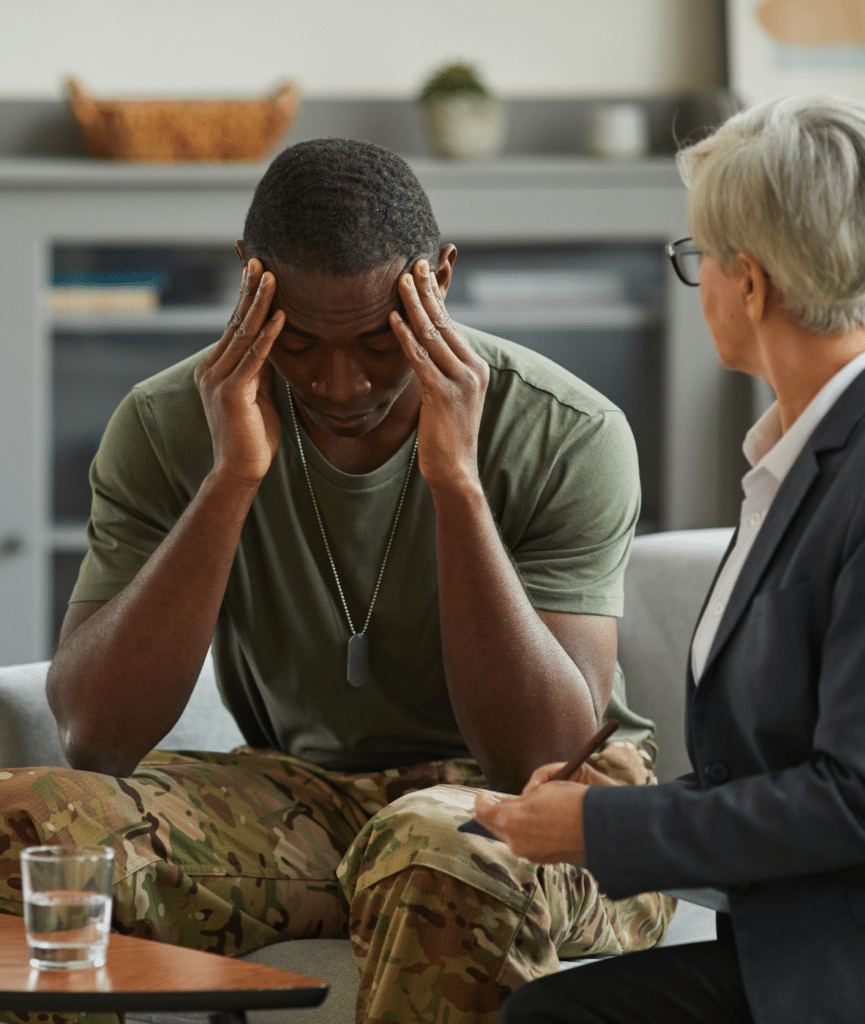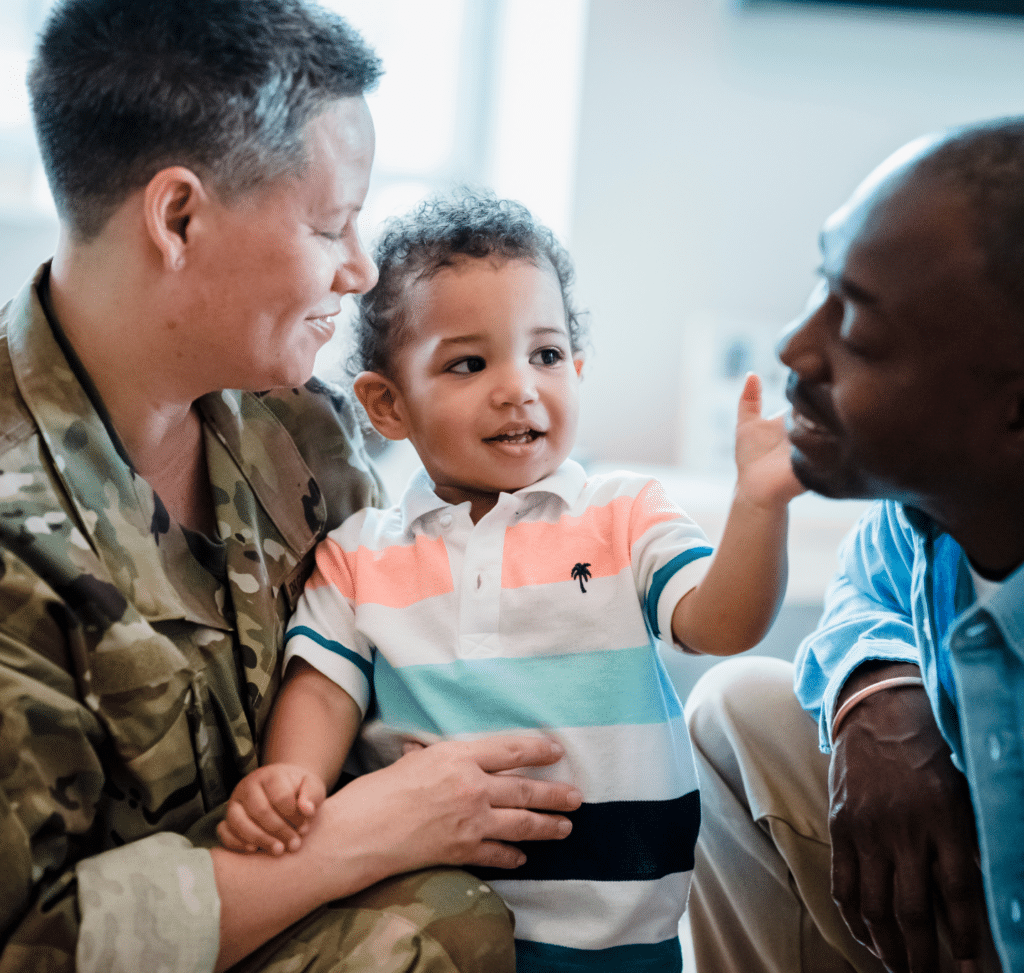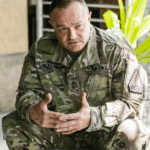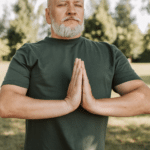The Role of Peer Support Groups for Veteran Mental Health Recovery

For many veterans, returning to civilian life isn’t the end of service – it’s the beginning of a different kind of battle. Mental health challenges like post-traumatic stress, depression, and anxiety often surface or intensify after discharge.
Yet, according to the U.S. Department of Veterans Affairs, less than 50% of returning veterans who need mental health treatment don’t receive it. Additionally, the 2021 National Veteran Suicide Prevention Annual Report showed that as many as 17 veterans took their own lives each day in 2019.¹
One study shows that veterans suffer in the following ways after leaving service:²
- Low life satisfaction
- Poor mental health
- Depression
- PTSD (post traumatic stress disorder)
- Financial distress.
When veterans struggle with their mental health in such ways, peer support for veterans becomes a necessity. Veteran recovery programs offer something unique: a connection rooted in shared experience. Whether veterans helping veterans is in a structured group or an informal conversation, it tends to encourage veterans to be more proactive in getting the help they need.
A mental health professional can help you understand and access veteran peer support groups, but this article also works as a helpful guide, covering…
- The role of peer support groups for veteran mental health
- How veteran peer support groups help
- How peer counseling for veterans complements traditional therapy
- What veteran peer support looks like in a mental health context
- The role of mentorship in veteran recovery programs
- Veteran peer support resources
- Where to find professional guidance on veteran peer support

The Role of Veteran Peer Support in Therapy
There’s a particular kind of silence that follows military service, and it doesn’t always show up right away. Sometimes it waits until the noise dies down and life starts looking “normal” again. For many veterans, this is when things get heavy. You might not be in the field anymore, but the tension sticks around. Sleep doesn’t come easily. Conversations with friends feel off. And therapy, while helpful, can still feel like something is missing.
This “something” is often about a lack of relatedness: a real, lived-in connection with someone who gets it. Peer support for veterans isn’t about fixing people. It’s about not having to explain every detail before being understood. It’s being in a room (or even just having a phone call) with someone who recognizes the same kinds of fear, pride, and pressure.
These bonds can ease what clinical treatment alone sometimes can’t. For this reason, veteran recovery programs are continuously weaving in these kinds of peer-led spaces as a core part of the healing process.
Let’s take a closer look at how these groups can help support veteran well-being.
How Support Groups for Veterans Help
Veterans are less likely than civilians to seek mental health care, and when they do, they’re more likely to drop out early.⁴ Research shows that peer support for veterans helps reduce symptoms of PTSD and depression, especially when it’s embedded in shared experience.⁵
This shared experience matters. In psychology, it’s known as “experiential credibility”; the influence and emotional understanding of someone who has personally survived what another person is going through.⁶
From a nervous system perspective, peer support also makes sense. Trauma healing works best when you feel safe enough in the presence of another person to downshift from hypervigilance.⁷
Plus, in clinical settings that integrate peer mentorship for veterans or veteran-led groups, dropout rates fall and engagement goes up.⁸ Simply put, the brain listens differently when it feels understood, and veterans helping veterans creates the kind of attuned connection that can’t be faked.
For all these reasons, attending a support group for veterans can help in the following ways.
Benefits of Veteran Mental Health Recovery Groups:
- Tailored treatment: Standard therapy approaches may not always be effective for veterans. Instead, veterans might need something that’s not only informed but tailored. What makes veteran mental health unique is the layering in terms of personal trauma, cultural norms about toughness, and a healthcare system that doesn’t always move fast enough. This is why finding the right support groups for veterans matters.
- Reduced mental health conditions: Some veterans carry invisible injuries. Trauma that wasn’t processed while in uniform. Depression that creeps in once the mission ends. Or anxiety that flares up in crowds, traffic, or quiet nights alone.³ These aren’t just aftershocks; for many, they’re the lingering effects of years spent in survival mode.
- Mood Issues: These struggles often show up subtly in a short temper, trouble sleeping, or numbness around people you love. It’s easy to think you’re just not adjusting well, or that you should be able to push through. But these are common signs of post-service mental health strain – signals that the nervous system is still carrying weight from what it’s been through.
How Peer Counseling for Veterans Complements Traditional Therapy
Therapy can be effective. The science backs it up, and for many people, it’s life-changing. But for veterans, especially those fresh out of service or carrying complex trauma, sitting across from a civilian in a softly lit office can feel like stepping into a different world.
This is where veteran-focused treatment can step in in ways that traditional therapy approaches can’t, including:
- Nuanced Understanding: There’s often a gap in language and lived experience in traditional therapy. You might be describing something that kept you alive, while the person listening tries to fit it into a diagnostic code. Even when well-meaning, this disconnect can feel like another burden to manage.
- Trust: The military builds a strong sense of internal cohesion, but it also instills caution around vulnerability. Opening up, especially to someone outside the culture, can feel risky. Add to this the stigma many veterans still feel around mental health care, and it’s not surprising that some hesitate to fully engage with therapy. Connecting with peers from the same background makes it easier to trust the process.
- Accessibility: Peer counseling for veterans allows veterans to show up as they are, in a space shaped by mutual understanding. While therapy offers tools, peer support offers terrain that feels familiar, and sometimes, this makes these tools more usable.
Peer support for veterans doesn’t replace formal treatment, but it strengthens it. Something changes when therapy is paired with peer connection, and when insight from a clinician is reinforced by someone who’s walked a similar path. This is the power of combining approaches. The professional can name the pattern. The peer can identify with the experience being shared.
The following information also discusses how veteran peer support improves recovery outcomes.
Peer-Led Support Groups vs. Clinician-Led Therapy
Clinician-led groups typically follow a set curriculum. They’re structured, professional, and focused on specific outcomes. Peer-led groups are different because they prioritize presence over protocol.
When peer support for veterans takes the lead, sessions tend to feel more flexible and less formal. Veterans often speak more freely, take more emotional risks, and engage more consistently when they’re in a space that doesn’t feel too clinical.
Strengthening Veteran Recovery Through Peer Networks
Connecting with other veterans for recovery is essential because healing deepens in community. Peer networks reduce relapse risk by increasing accountability, emotional safety, and social engagement. These aren’t just friendships – they’re systems of co-regulation and mutual repair. Peer support for veterans works best when it’s consistent, culturally attuned, and rooted in shared meaning.
PTSD Peer Support Builds Trust and Reduces Isolation
PTSD often pulls people inward. It isolates and distorts. And it convinces many that no one could understand what they’ve seen or felt.¹⁰ This is why veteran-specific PTSD peer support makes such a difference.
In PTSD peer groups, there’s no need to filter language or justify emotions. The reactions are familiar. The symptoms are shared. This normalizes the experience, reduces shame, and opens the door to healing. Peer-led support doesn’t erase trauma, but it makes it easier to sit with. And for veterans, that can be the first real relief in a long time.
What Is Veteran Peer Support in a Mental Health Context?
In mental health settings, peer support means feeling heard by someone who’s lived through similar challenges. They don’t act as a therapist, but as a guide who understands the terrain firsthand.
For veterans, the benefits of peer support in recovery are derived from:
- Group meetings led by fellow vets
- One-on-one peer mentorship for veterans
- Informal check-ins with someone who’s further along in recovery
Peer supporters often receive training, especially in structured programs, but what makes their role powerful isn’t textbook knowledge – it’s credibility through understanding.
Treatment options that veteran peer support can benefit often include:
Peer Mentorship for Veterans and Veteran Recovery Programs
Evidence suggests that peer-led counseling and activities can positively impact the well-being of veterans and their family members. ⁹ But, over time, peer support for veterans can evolve into something deeper: mentorship.
When a veteran is mentored by someone else, their recovery is supported through modeling and reinforcement. For instance, seeing someone further along in healing activates hope and mirrors new behaviors.
Yet the shift into mentorship can bring a sense of structure, consistency, and responsibility, which are factors that strengthen long-term recovery. When a veteran supports someone else through their healing, it reinforces their progress. It also restores a sense of purpose, which is often one of the first things lost after leaving service. In other words, mentorship is a two-way benefit that turns support into momentum.
Mental Health Peer Support Groups: Local and National Resources for Veteran Peer Support
In addition to the U.S. Department of Veterans Affairs (VA), many nonprofit organizations and local veteran centers offer peer-led support groups that make connecting with other veterans for recovery simpler.
National programs like Team RWB, The Mission Continues, and the Wounded Warrior Project also provide:
- Mental health peer support groups
- Social support for veteran mental health
- Community events
- Wellness initiatives
- Mentorship opportunities
If you’re unsure where to begin or want to find group therapy for veterans closer to home, Mission Connection provides outpatient services. These services include peer support for veterans as part of a broader mental health care plan tailored to meet your needs.
Getting Connected: How to Find Veteran Peer Support
You don’t have to wait for a crisis to reach out or investigate connecting with other veterans for recovery. Many veterans benefit from connection long before a formal diagnosis or treatment plan. And while it can feel overwhelming to take the first step, support is more accessible than it may seem.
Peer support for veterans and social support for veteran mental health starts with one conversation – and Mission Connection is here to help. We believe in strengthening veteran recovery through peer networks and providing readily available support. Whether you’re looking for group therapy for veterans, peer mentorship, or someone who understands the day-to-day weight of transition, we can help you find what you need. Contact our team today to start the journey into long-term recovery.

References
- Many veterans’ mental health issues go untreated. (n.d.). U.S. Department of Veterans Affairs. Retrieved May 30, 2025, from https://www.va.gov/albany-health-care/stories/many-veterans-mental-health-issues-go-untreated/
- Bond, G. R., Al-Abdulmunem, M., Drake, R. E., Davis, L. L., Meyer, T., Gade, D. M., Frueh, B. C., Dickman, R. B., & Ressler, D. R. (2022). Transition from military service: Mental health and well-being among service members and veterans with service-connected disabilities. The Journal of Behavioral Health Services & Research, 49(3), 282–298. https://link.springer.com/article/10.1007/s11414-021-09778-w
- Karstoft, K.-I., Nielsen, A. B. S., & Nielsen, T. (2017). Assessment of depression in veterans across missions: A validity study using Rasch measurement models. European Journal of Psychotraumatology, 8(1), 1326798. https://pmc.ncbi.nlm.nih.gov/articles/PMC5475352/
- Sayer, N. A., Clothier, B., Spoont, M., & Nelson, D. B. (2007). Use of mental health treatment among veterans filing claims for posttraumatic stress disorder. Journal of Traumatic Stress, 20(1), 15–25. https://pubmed.ncbi.nlm.nih.gov/17345650/
- Pfeiffer, P. N., Pope, B., Houck, M., Benn-Burton, W., Zivin, K., Ganoczy, D., Kim, H. M., Walters, H., Emerson, L., Nelson, C. B., Abraham, K. M., & Valenstein, M. (2020). Effectiveness of peer-supported computer-based CBT for depression among veterans in primary care. Psychiatric Services (Washington, D.C.), 71(3), 256–262. https://pubmed.ncbi.nlm.nih.gov/31931686/
- Solomon, P. (2004). Peer support/peer provided services: Underlying processes, benefits, and critical ingredients. Psychiatric Rehabilitation Journal, 27(4), 392–401. https://pubmed.ncbi.nlm.nih.gov/15222150/
- UNC School of Social Work. (2021, July 19). In conversation with Stephen Porges: Polyvagal theory, trauma, co-regulation, and healing. https://cls.unc.edu/01-31-2022-in-conversation-with-stephen-porges-polyvagal-theory-trauma-co-regulation-and-healing
- Chinman, M., McCarthy, S., Mitchell-Miland, C., Bachrach, R. L., Schutt, R. K., & Ellison, M. (2019). Predicting engagement with mental health peer specialist services. Psychiatric Services (Washington, D.C.), 70(4), 333–336. https://pubmed.ncbi.nlm.nih.gov/30755129/
- Mercier, J.-M., Hosseiny, F., Rodrigues, S., Friio, A., Brémault-Phillips, S., Shields, D. M., & Dupuis, G. (2023). Peer support activities for veterans, serving members, and their families: Results of a scoping review. International Journal of Environmental Research and Public Health, 20(4), 3628. https://pmc.ncbi.nlm.nih.gov/articles/PMC9964749/
- van der Kolk, B. A. (2000). Posttraumatic stress disorder and the nature of trauma. Dialogues in Clinical Neuroscience, 2(1), 7–22. https://pmc.ncbi.nlm.nih.gov/articles/PMC3181584/






